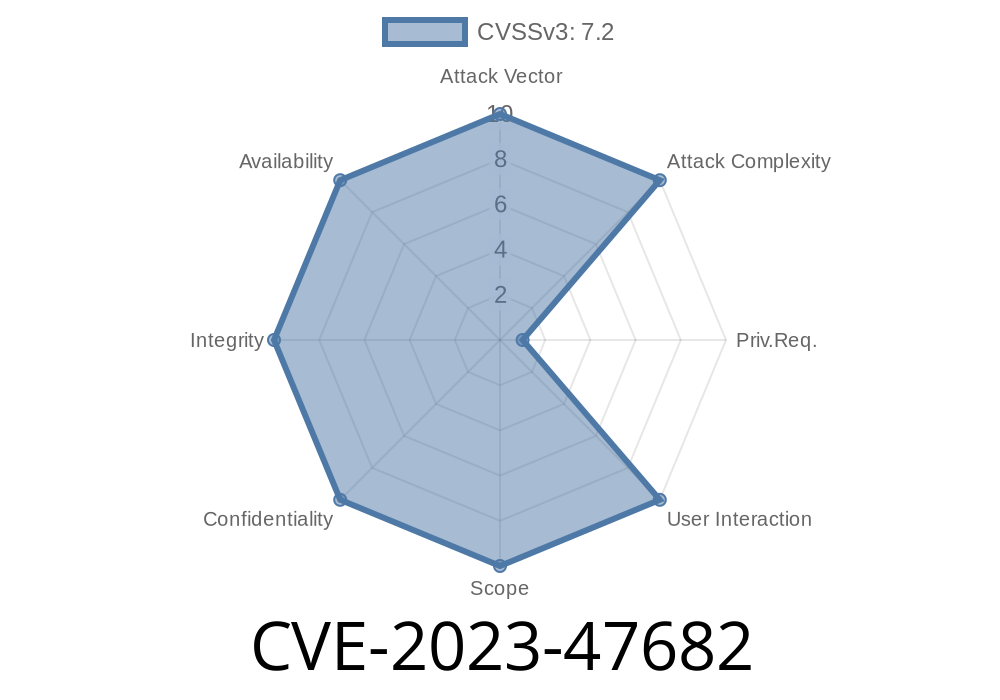WordPress plugins often make life easier, but they can also introduce nasty vulnerabilities. In this post, we’ll unpack CVE-2023-47682, a privilege escalation bug in the popular *weDevs WP User Frontend* plugin, exposing how attackers can gain unauthorized access and what you should do to stay safe. All content here is explained in simple plain language, with original sources and code snippets for better understanding.
What is WP User Frontend?
WP User Frontend is a plugin used by thousands of WordPress site owners to allow users to register, edit profiles, submit posts, and more—from the front end of a website. It makes things smoother by not forcing users into WordPress admin.
Unfortunately, sometimes that same convenience comes with risk.
About CVE-2023-47682
CVE-2023-47682 is an *improper privilege management* vulnerability in the WP User Frontend plugin, affecting all versions up to and including 3.6.5. This bug can let a regular user get admin-level powers, which opens the door for a total site takeover.
Vulnerable plugin:
WP User Frontend
Affected versions: Up to 3.6.5
Patched in: 3.6.6
Type: Privilege Escalation
CVE official link: CVE-2023-47682
How It Works: The Dirty Details
The vulnerability exists because of *improper privilege checks* in the plugin’s code. Let’s break down what’s happening:
Internally, it fails to properly check what a user is allowed to change.
- Attackers can exploit this by modifying their user data to bump their own privileges (for instance, from subscriber to administrator).
Below is a simplified code sample representing what might go wrong in handling field updates
if ($_POST['user_role']) {
// The plugin does NOT check if the current user is allowed to change the role.
// It just updates the user's role with what was submitted!
$user_id = get_current_user_id();
wp_update_user([
'ID' => $user_id,
'role' => sanitize_text_field($_POST['user_role'])
]);
}
The problem?
_There’s no check to verify whether the currently logged-in user can assign themselves (or others) higher roles._ Anyone can submit “administrator” as a value and be instantly promoted.
How Attackers Exploit CVE-2023-47682
This exploit requires an attacker to have an account on the vulnerable WordPress site (even a basic Subscriber). Once registered, the steps are simple:
Log in as a low-privileged user.
2. Send a crafted POST request to the profile editing endpoint, supplying the user_role parameter set to administrator (or any desired privileged role).
Here’s a simple CURL example
curl -X POST -d "user_role=administrator" -b "wordpress_logged_in_cookie" \
https://example.com/wp-admin/admin-ajax.php?action=wpuf_update_profile
Impact: Why It’s Bad
- Full site takeover: Attackers could add/delete users, install backdoors, or take your site offline.
Defacement or malware: Insert malicious code or spam.
At its core, privilege escalation bypasses WordPress’ careful role system and opens the gates for any logged-in user to seize control.
Fix: How to Stay Safe
WeDevs fixed the problem in WP User Frontend 3.6.6.
*If you use any version up to and including 3.6.5:*
Resources
- Official plugin changelog
- NVD CVE-2023-47682 entry
Conclusion
CVE-2023-47682 is a classic case of a simple logic error leading to a devastating WordPress site compromise via WP User Frontend. If you run this plugin, patch today. If you’re helping clients, make sure their plugins are up to date.
Stay safe, keep everything patched, and don’t forget to check for overlooked privilege management when writing your own plugins!
More reading
- WPScan advisory (link)
- How to find your WordPress version and update plugins
Timeline
Published on: 05/17/2024 09:15:11 UTC
Last modified on: 06/06/2024 12:48:31 UTC
